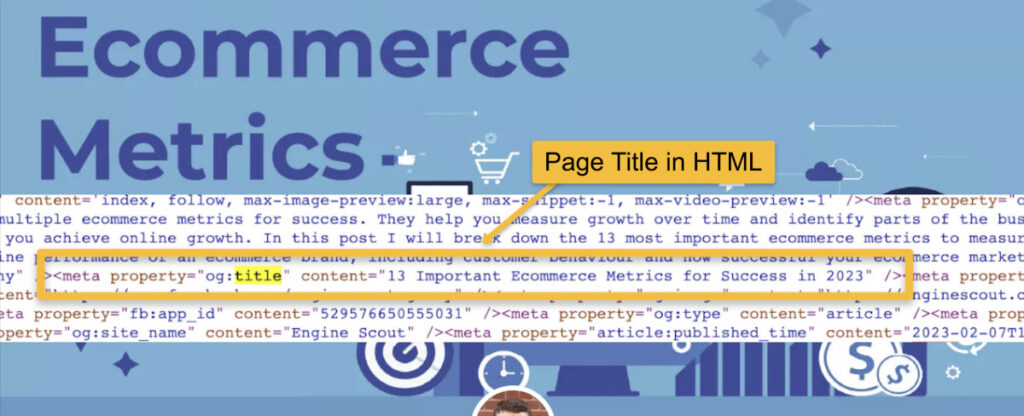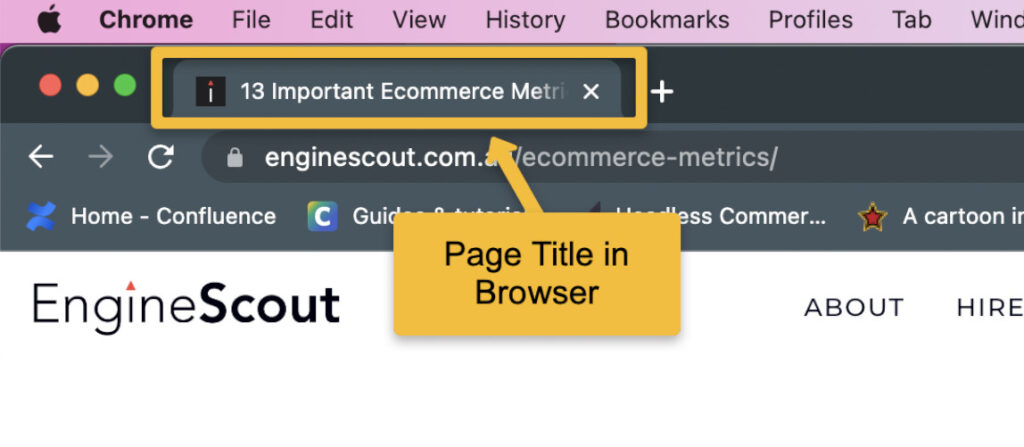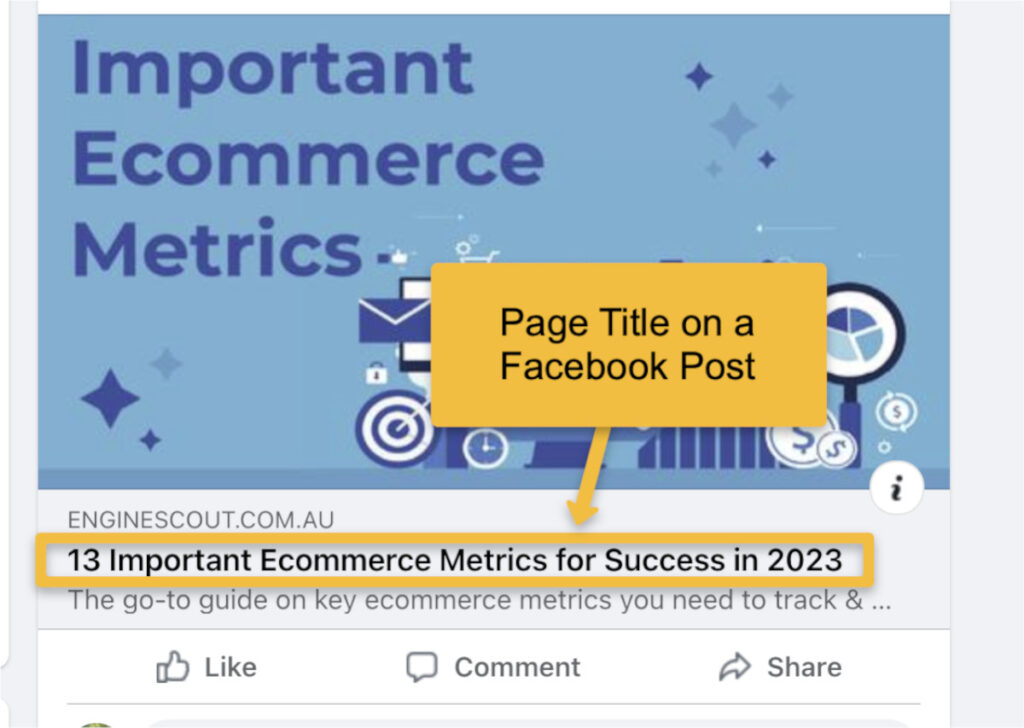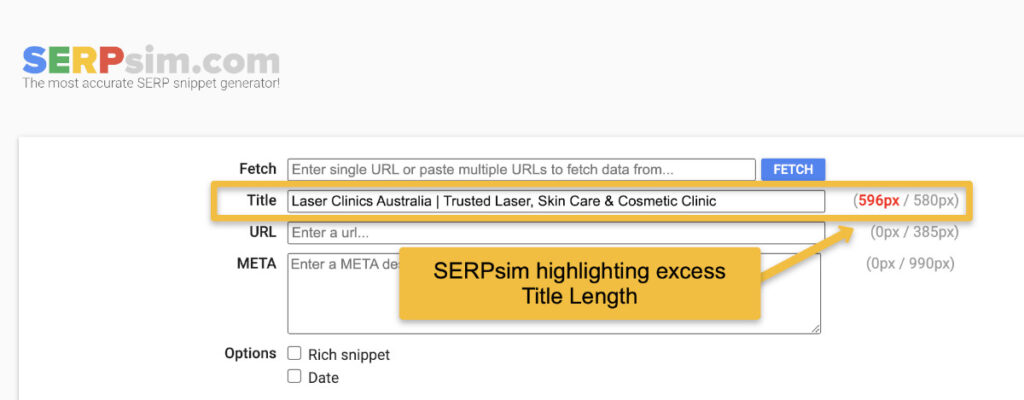Title tags are an HTML element that allow you to give a web page a title. It’s crucial to add and optimise your website’s title tags, as they play an essential role in terms of organic ranking (SEO). This title can be found in the browser title bar, as well as in the search engine results pages (SERP).
The title tag is an HTML code that you can use to add a title to your web page.
A title tag [also referred to as a meta title] summarises the contents of a page in a few prominent characters, catchy enough to draw attention. They are an important feature of any webpage, be they homepages, category or service pages, product pages, and even blog posts and about us pages.
You can find a webpage’s title in the:
<title>insert page title</title>



Bonus: Title tags are also visible on Social Media posts beneath the featured image.

If you’re using a CMS such as Shopify, or WordPress, it can be fairly simple to change these title tags without having to dive into the HTML codes.
But before you go on changing up your title tags, keep reading to learn more about why they’re important for Search Engine Optimization [SEO], and how you can make the most out of them.
Title tags happen to be useful both for the customer, and the search engine. This means that even though you want to create an enticing caption for your visitors, you also need to have a title that is understandable by the search engine, and falls within its algorithms.
When it comes to Search Engines, title tags are part of any on-page SEO strategy. Since you’ll often find them as headlines in the search snippets on search result pages, title tags need to be optimised for Google to understand each page of your website correctly, and return it for the right search queries. An accurate, and relevant title tag is a ranking factor and can help Google to rank your website higher as well, given other major SEO elements are also taken care of.
Title tags are equally important, if not more, for potential site visitors. If you think about it, title tags are the first thing you see in search results, and a concise and convincing title tag can often be the difference between you clicking on that search result.
Making the most out of a simple title tag boils down to striking the right balance between an SEO title tag and a title for the users that can improve your click-through rates.
Now that you know why title tags are important for your webpages and brand, let’s go over the things you need to keep in mind when building your title tags.
Again, since title tags are both for your customers and search engines, creating the best title tags come with some key considerations.
Keywords are important in SEO, and title tags with the primary keyword are hands down, preferred by Google. However, Google’s algorithm is also capable of understanding broad-match, or semantic variations in keywords. Make sure you don’t stuff the title with keywords, because that can be a big turn off for readers and appear spam-like. Instead, opt for creative copy that uses target keywords, but also appears well-formulated and catchy.

A different title, relevant to only the page in question will make it easy for both Google and your customers to identify separate pages, products, and services. Duplicate title tags are often considered an SEO issue that needs to be addressed immediately for Google to better differentiate and rank web pages.
Creating engaging titles is no question, since you’re optimising your titles for potential customers as well. Targeting compelling words such as Shop, Buy, Sale, New, Limited etc. can help drive more visitors to your page since they either directly invite searchers to your site, or develop curiosity for the same.

It is generally a best practice to add the brand or company name to your page title tags, especially if it’s a renowned one and can drive more clicks. For brand centric pages such as the home page, or about us page, this is mandatory. However, if you’re running an ecommerce business then for product and category pages, brand names can sometimes be replaced with product benefits or other useful information instead.

When creating title tags, remember to keep them as brief and precise as possible, especially to avoid Google truncating your displayed title on SERPs, or replacing it altogether. However, be careful not to under utilise the length capacity, as you can use that space for valuable keywords, as well as important benefits and brand names. The exact length for title tags has been covered later. Additionally, using special characters [e.g. |, -, “,] for your titles also helps reinforce their brevity, as readers get to read it in small chunks, instead of as one long sentence.


Considering these four elements, a simple title tag would include:
Primary Keyword + Secondary Keyword | Brand Name
And given this format, here’s an idea of what a good and bad page title might look like:
So what does it mean to be short with your title tag?
Generally, title lengths are to be kept under 600 px [or 580px, if we’re being stringent], for Google to display them as is. This is based on the pixel width on SERPs, which translates into 50-60 characters. However, given pixel width restrictions, some characters, such as uppercase letters, will take up more space than lowercase ones, so keep that in mind when crafting your title.
There are many online tools available that help you to write your title tag for Google’s desired length. Consider SERPsim, which helps you limit your title tags, as well as URLs and meta descriptions to the pixel width limitations of search engine results.

We already discussed why title tags are important in the first place, but are they needed for each and every page?
For a positive user experience and easy navigation, you should definitely have titles for all your pages. Plus, the best sites for Google will probably have a unique title for each page on their website, since it makes Google’s job much easier.
When you don’t have titles for your webpages, Google ends up generating title tags for display in SERPs based on the content of your site. But Google can not be guaranteed to create ranking titles for your site, and you may lose out on your CTR if you’re sloppy with your page titles.
If you’re just starting out with your business, consider creating unique titles for your most important pages [homepage, collections, services, products, contact and locations] and take it from there. If you have an established site though, and need to review your page titles, you could also use SIte Audit tools to identify pages with missing titles, and work on those first. Consider exploring site audit options in SEMrush, Ahrefs and Screaming Frog.
If you follow these basic guidelines, writing inventive titles should be no problem, and you could potentially get better organic traffic and CTR numbers.
Even though Title Tags should be a priority in your on-page SEO plans, it’s not enough to just improve your titles. Make sure to gauge their impact on your webpages and see if they change in rankings, or traffic. Depending on the results, you may have to make additional on-page changes related to your meta description, H1 tags and page content as a whole.
If you’re still in doubt, don’t hesitate to reach out to an SEO agency to help you through your on-page SEO.
Request your free marketing audit from us today: